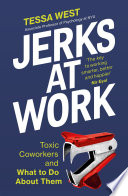

In 'Jerks at Work', authors Tessa West and others delve into the pervasive issue of toxic behavior in the workplace, offering insights and strategies for identifying and managing difficult individuals. The book categoriz...
Continue readingIn 'Jerks at Work', the authors categorize workplace jerks into various types, such as the 'bully', 'know-it-all', 'slacker', and 'gossip'. Understanding these categories is crucial for diagnosing the source of toxicity ...
Continue readingThe presence of jerks in the workplace can have a profound effect on organizational culture. Toxic behaviors can lead to decreased employee engagement, higher turnover rates, and a decline in overall productivity. The bo...
Continue readingThe book offers practical strategies for dealing with jerks effectively. These strategies include setting boundaries, documenting interactions, and seeking support from colleagues or supervisors. The authors emphasize th...
Continue readingLeadership plays a critical role in shaping workplace culture and addressing jerks. The authors argue that leaders must take an active stance in identifying and addressing toxic behaviors. This involves not only setting ...
Continue readingEmotional intelligence (EI) is a key theme in 'Jerks at Work'. The authors argue that developing EI can help individuals navigate difficult interpersonal situations more effectively. High EI enables employees to recogniz...
Continue readingBuilding a supportive network is essential for coping with jerks at work. The authors suggest that employees should seek out allies who can provide encouragement and perspective when facing difficult situations. This net...
Continue readingTolerating jerks in the workplace can have long-term consequences for both individuals and organizations. The authors highlight that failing to address toxic behaviors can lead to a culture of complacency, where disrespe...
Continue readingThe reading time for Jerks at Work depends on the reader's pace. However, this concise book summary covers the 7 key ideas from Jerks at Work, allowing you to quickly understand the main concepts, insights, and practical applications in around 23 min.
Jerks at Work is definitely worth reading. The book covers essential topics including Identifying Different Types of Workplace Jerks, The Impact of Jerks on Workplace Culture, Strategies for Dealing with Jerks, providing practical insights and actionable advice. Whether you read the full book or our concise summary, Jerks at Work delivers valuable knowledge that can help you improve your understanding and apply these concepts in your personal or professional life.
Jerks at Work was written by Tessa West.
If you enjoyed Jerks at Work by Tessa West and want to explore similar topics or deepen your understanding, we highly recommend these related book summaries:
These books cover related themes, complementary concepts, and will help you build upon the knowledge gained from Jerks at Work. Each of these summaries provides concise insights that can further enhance your understanding and practical application of the ideas presented in Jerks at Work.